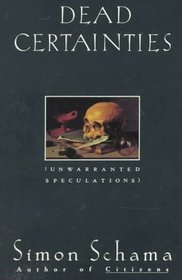In short- PBS did a nice documentary covering the murder case at the center of the book, interviewing Schama extensively for his knowledge of the case, watch that rather than trying to wade through this.
Schama writes very well and engagingly but has too much going on in this one to draw the connections completely convincingly (sorry for unintentional alliteration). He is trying to draw together the death of General Wolfe during the Seven years (French&Indian) war with the scholarship of Francis Parkman and the murder of Parkman's uncle George. Yes a connection exists (Francis P, of course), but the meaning of this or its significance to history is not clear other than being an interesting footnote to F. Parkman's bio. Also, while his first chapter presents some great primary source use for the battle, his interpretations are in many places flawed, over generalized or unsupported by his evidence. Granted, his subtitle is unwarranted speculations but he is making an argument that still requires it have support. He does a bit of fictionalizing, imagining what various people were thinking with no evidence that what he presents has any truth and while this may make the book more interesting for the lay reader who is not a historian, it builds on previous flaws to decrease the reliability of his overall argument. In a nutshell- some interesting parts about historical events, the 'creation' of history by the historian and the role of cultural memory that deserve greater examination, but the premise is flawed and his argument is weak
Schama writes very well and engagingly but has too much going on in this one to draw the connections completely convincingly (sorry for unintentional alliteration). He is trying to draw together the death of General Wolfe during the Seven years (French&Indian) war with the scholarship of Francis Parkman and the murder of Parkman's uncle George. Yes a connection exists (Francis P, of course), but the meaning of this or its significance to history is not clear other than being an interesting footnote to F. Parkman's bio. Also, while his first chapter presents some great primary source use for the battle, his interpretations are in many places flawed, over generalized or unsupported by his evidence. Granted, his subtitle is unwarranted speculations but he is making an argument that still requires it have support. He does a bit of fictionalizing, imagining what various people were thinking with no evidence that what he presents has any truth and while this may make the book more interesting for the lay reader who is not a historian, it builds on previous flaws to decrease the reliability of his overall argument. In a nutshell- some interesting parts about historical events, the 'creation' of history by the historian and the role of cultural memory that deserve greater examination, but the premise is flawed and his argument is weak




